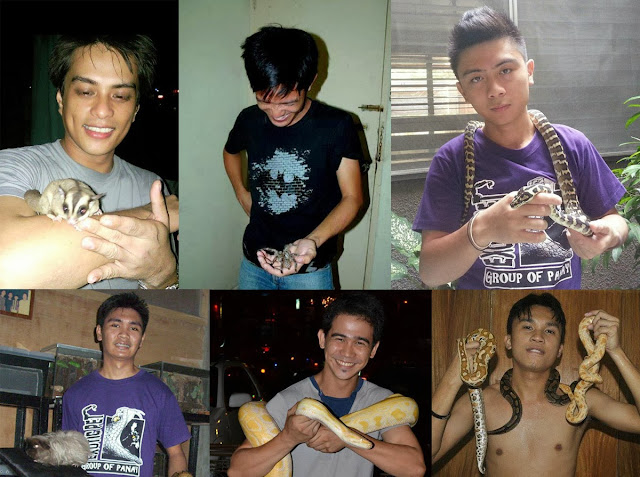Caring for exotic pets like snakes and tarantulas
Iguanas, snakes, scorpions, and other exotic animals are best friends for the not-so-faint at heart and for those who are aware that these creatures are just misunderstood.
Like the 50-member Exotic Pets Group of Panay (EPGOP) which was formed through social networking site Facebook.
“Our group aims to aid in the conservation of both native and foreign wildlife species through captive breeding programs; to enrich knowledge and eliminate misinformation regarding exotic pets; and to promote responsible pet-keeping,” said Genesis Steel Paspe who owns a guinea pig and ball python.
“Our first eyeball was on December 2011 and after a couple of months, we had monthly gatherings to welcome new members. The group started being active in the community in 2012,” added Paul Tristan Sianson Huyong, owner of a ball python named Tamashi and a carpet python named Teemo.
Nathan Sotto, who owns sugar gliders named Salt and Pepper, initiated the one-year-old project “Zoom” or Zoo on the Move, the goal of which is to conduct lectures and exhibits in schools.
“Through this, we are able to share our hobby and what we have learned, to the students. We taught them about responsible pet keeping. By having a live encounter with the animals, they will realize that the information from television is wrong and these animals, aside from dogs and cats, can be pets. They are also taught how important it is to take care of exotic pets in the wild,” Sotto said.
SOME MISCONCEPTIONS
“They say that snakes are evil, pests and are dangerous but in fact, snakes are the farmers’ best friends because they reduce the population of rodents that destroy plantations,” said Will Decara, owner of a python.
“Spiders and scorpions eat insects including man’s enemy, the cockroach. When people see a tarantula, they say that it is ‘dalitan’ or venomous. Yes, they are but not potent enough to kill a healthy human being,” he explained.
Peter June Duarte said these can bite only if provoked. “This is their defense mechanism,” he said.
“People are afraid of these animals because they lack information about them,” said Earvin John Diones, who owns scorpions.
“Just because an animal is not cute and fluffy, it does not deserve to be loved,” Duarte added.
CARING FOR EXOTIC PETS
“Keeping exotic pets involves low-cost maintenance,” said Huyong. He shares the following tips:
HOUSING. For most keepers, plastic bins bought from department stores are used to house their pets. Put a little modification for proper ventilation. Glass or acrylic terrariums/aquariums may be used.
FEEDING. Snakes, tarantulas, and scorpions are fed once a week because of their slow metabolism. Sugar gliders, hedgehogs, and guinea pigs are fed more frequently. They must have water all the time.
HANDLING. The group owns captive-bred animals, meaning they were not taken from the wild. So, they are accustomed to human presence and can be handled easily without stressing them much. Snakes, monitor lizards, sugar gliders, hedgehogs, and others can be handled while invertebrates like tarantulas and scorpions, as a golden rule, should not be handled. Invertebrates are very unpredictable and they do not recognize their owners. Diones has 10 different scorpion species, with a total of 21 animals.
“The reason why I’m taking care of these animals is that I like watching their behavior. Breeding them is also my top priority in order to provide Iloilo’s hobbyists with rare species so they won’t go into the trouble of importing them which is illegal,” he said.
ACCIDENTS/INJURIES. Following the golden rule has kept the invertebrate-related injuries to nearly 0. So far there's only been one recorded incident in the group. A member was accidentally stung by a scorpion (Hottentotta hottentotta), but he said that he suffered from fever and slight headaches for a few days. Snakebites have occurred in some during feeding, but these are non-venomous bites. Some bites did not hurt at all.
WILDLIFE
Snakes, tarantulas, and the like are considered wild animals.
An animal welfare expert, Nena Hernandez said, “We have to be more aware of preserving our wildlife as it is integral to the balance of nature. Animal welfare tends to focus on companion animals alone, which is a priority no doubt, but we should also begin broadening our work to include both agricultural animals and wildlife once we are ready to do so. We should not forget that animal welfare encompasses all animals.”
Diones shared, "There are things in this world that we may not be able to thoroughly understand, but it does not mean that we need to fear them. As Pocahontas said, 'If you walk into the footsteps of a stranger you will learn things you never knew you never knew."
As a parting shot, Huyong said, "Stop the senseless killing of snakes as they are a vital part of the ecosystem. Imagine a world without snakes. The same goes with other exotic animals.”
"When you want to own an exotic pet, make sure you can provide everything that your pet needs before buying it. Because they are not toys, we consider them as part of our family," Paspe said.
“Pets are humanizing. They remind us we have an obligation and responsibility to preserve and nurture and care for all life,” said Sotto.
 |
EPGOP visits schools under its Zoom project |





